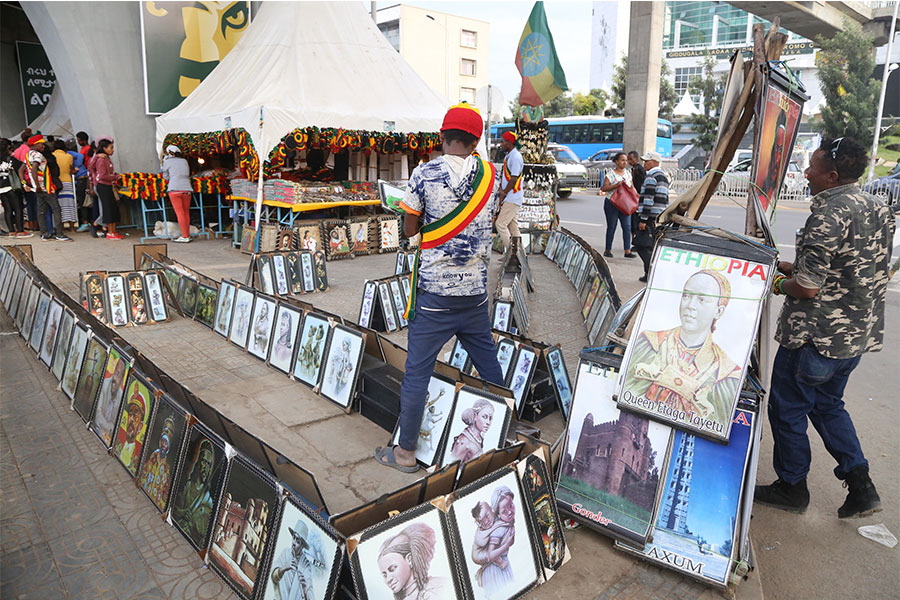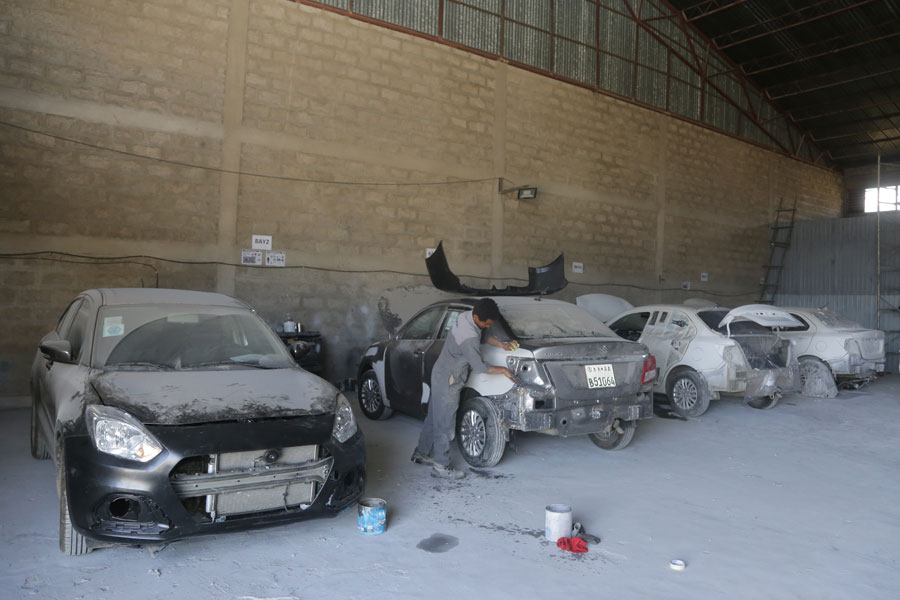
Advertorials | Aug 05,2025
Getachew Dinku, a university professor, was surprised by the significant increase in import taxes and duties when he recently imported an electric vehicle. The devaluation of the Birr and new VAT regulations caused duties and tax costs to skyrocket from an estimated 470,000 Br to over two million Br. "It was unexpectedly high,' he said, claiming that VAT alone had doubled his tax requirements to 935,000 Br.
He also criticized customs officials for overvaluing imported goods to prevent under-invoicing.
His vehicle reached Gelan Dry Port after staying for four months in Djibouti as there were delays with customs—a costly delay. He recalls vehicles being stranded in Gelan for weeks with importers holding out with hopes the government will reconsider the tax burden. Their hopes didn’t bear fruit.
"New VAT requirements have taken importers aback," he said. "They were hoping for VAT changes." However, nothing changed for the new vehicle importers. Instead, vehicles began piling up at the dry port.
When the Ethiopian Customs Commission (ECC) Gelan terminal branch cautioned of confiscations, importers like Getachew, left with no choice, were compelled to pay all the tax requirements and take ownership. "We had no choice but to make the payments," he said.
Sweeping changes have been implemented by ECC in how import duties are calculated, rattling businesses across sectors as well as individual EV buyers. The new VAT proclamation, on the other hand, has also cornered EVs to be subjected to VAT.
Henok Tadese, a prospective car buyer in Addis Abeba, was set on purchasing a gasoline-powered vehicle amidst the fluctuating automotive market. His initial plan was to find a reliable, petroleum-powered car in the Bole Atlas neighbourhood, a popular area for vehicle shopping.
"I couldn’t find them," Henok recalled, noting the rapid changes in vehicle availability.
Faced with this scarcity, he made the unexpected decision to purchase an EV, settling on a Toyota BZ4X for six million Birr at the time. According to Henok, the decision was influenced by the vehicle’s relatively better resale value and the availability of spare parts.
His decision was costly. Had he purchased the car just a few days earlier, he would have saved over 700,000 Br. The drastic price increase was triggered by the recent macroeconomic reform, which led to the liberalization of the foreign exchange market. This policy shift, aimed at allowing market forces to determine the exchange rate, led to a rapid escalation in vehicle prices.
The federal government’s drive towards environmental sustainability and reducing fuel import expenses has played a notable role in the changing automotive space. In January, the government imposed a complete ban on the import of petroleum-powered vehicles. This move was part of a broader strategy to promote environmentalism and manage fuel import costs more effectively. Coupled with this ban, the government introduced reduced import taxes and duties for EVs, creating a favorable environment for the adoption of eco-friendly vehicles.
Before that, Prime Minister Abiy Ahmed’s (PhD) administration rolled out a series of incentives designed to bolster the EV market. These include exemptions from excise tax and surtax for all EVs, as well as reduced customs duties. Specifically, customs duties for EVs have been structured as follows: completely knocked-down (CKD) kits for local assembly are fully exempt from customs duties, semi-knocked-down (SKD) kits attract a five percent duty, and fully built EVs face a 15pc duty. The government's ambitious plan aims to have nearly half a million EVs on roads over the next decade.
Despite these incentives, the EV market is facing challenges. The recently enacted VAT Proclamation replaced the previous exemption and introduced additional cost burdens for buyers. The prices of vehicles have surged consequentially. Taxes and duties on cars have increased, with some prices rising by up to two million Birr. The price of the 2023 Toyota RAV4 hybrid has jumped to more than 15 million Br, while the cost of the Toyota BZ4X has grown by 1.5 million Br.
Banks and microfinance institutions have also responded by tightening their lending policies for EV purchases, limiting their risk exposure to the relatively new technology. Concerns about the longevity and high replacement costs of EV batteries have led to shorter repayment periods for loans. Similarly, insurance providers are grappling with the challenges of limited knowledge about EVs and the increased costs of spare parts.
Yonatan Sisay, a technician at Gerar EV Workshop, has observed firsthand the difficulties in sourcing spare parts. The workshop, which began operations last year, now serves 10 to 15 EVs daily. However, due to import constraints and foreign exchange limitations, the workshop struggles to keep essential parts like bumpers, rearview mirrors, and lights in stock. Maintenance fees have also increased, with mandatory software updates costing between 50 to 500 dollars. The high cost of maintenance is partly attributed to software subscriptions, adding another layer of expense for EV owners.
Moreover, the dearth of fast public chargers poses a significant hurdle, especially for those needing to travel long distances. The existing chargers in the capital are largely idle, awaiting tariff regulations from the authorities. This lack of infrastructure further discourages potential buyers and complicates the transition to electric mobility.
Ethiopia, with its population exceeding 120 million, has one of the lowest rates of automobile ownership globally, with approximately one vehicle per 100 people, according to the U.S. Department of Commerce. The government’s push towards EVs is seen as a way to address this disparity while promoting environmental sustainability. As of July 22, 2024, the Ministry of Transport reported 8,739 registered EVs in Addis Abeba, with the highest numbers in the districts of Kirkos, Bole, and Nefas Silk Lafto. In contrast, there were 1.2 million vehicles in the country as of July 2020.
Zerihun Assefa, ECC communications director, confirmed that tariffs are determined by the Ministry of Finance. An unofficial source also confirmed that the VAT exemption for EVs has been revoked by the new VAT Proclamation. Also, all vehicles, including EVs, are now subject to a three percent social welfare tax. This means that the total tax and duty burden on a single EV can reach up to 33pc. Further, the Birr’s devaluation has exacerbated port fees, shipping expenses, and insurance. The combined impact has made EV ownership much more expensive and out of reach for many initially excited by lowered costs.
As Ethiopia navigates these evolving market dynamics, the country’s ambitious goals for increasing EV adoption face both opportunities and obstacles. The government’s incentives and policies have created a less favorable environment for EVs than just a few months before. The challenges of high costs, limited infrastructure, and fluctuating market conditions must be addressed to ensure long-term success alongside stable and predictable government policies.
Atlaw Alemu (PhD), an economics lecturer at Addis Abeba University, commented on the broader economic implications of these developments. He noted that the increased prices of vehicles are likely to affect market demand. As vehicle costs rise, consumers’ purchasing power diminishes, potentially limiting the success of the government’s policy aimed at replacing petroleum-fueled vehicles. Alemu’s insights highlight the delicate balance between promoting sustainable transportation and ensuring affordability for the average consumer. Perhaps most at play is the government’s growing appetite for increased revenues.
The journey towards a more sustainable automotive market in Ethiopia is ongoing and fluid, with stakeholders across the public and private sectors playing critical roles in shaping its future. As the market adapts to these changes, the hope is that innovation and strategic planning will pave the way for a more accessible and environmentally friendly transportation system.
PUBLISHED ON
Sep 29,2024 [ VOL
25 , NO
1274]

Advertorials | Aug 05,2025

Fortune News | Jul 19,2025

Radar | Apr 26,2019

Featured | Oct 27,2024

Fortune News | Nov 26,2022

Agenda | Jan 21,2023

Fortune News | Sep 03,2022

Radar |

Radar | Aug 13,2022

Fortune News | Aug 25,2024

Dec 22 , 2024 . By TIZITA SHEWAFERAW
Charged with transforming colossal state-owned enterprises into modern and competitiv...

Aug 18 , 2024 . By AKSAH ITALO
Although predictable Yonas Zerihun's job in the ride-hailing service is not immune to...

Jul 28 , 2024 . By TIZITA SHEWAFERAW
Unhabitual, perhaps too many, Samuel Gebreyohannes, 38, used to occasionally enjoy a couple of beers at breakfast. However, he recently swit...

Jul 13 , 2024 . By AKSAH ITALO
Investors who rely on tractors, trucks, and field vehicles for commuting, transporting commodities, and f...

Oct 25 , 2025
The regulatory machinery is on overdrive. In only two years, no fewer than 35 new pro...

Oct 18 , 2025
The political establishment, notably the ruling party and its top brass, has become p...

Oct 11 , 2025
Ladislas Farago, a roving Associated Press (AP) correspondent, arrived in Ethiopia in...

Oct 4 , 2025
Eyob Tekalegn (PhD) had been in the Governor's chair for only weeks when, on Septembe...